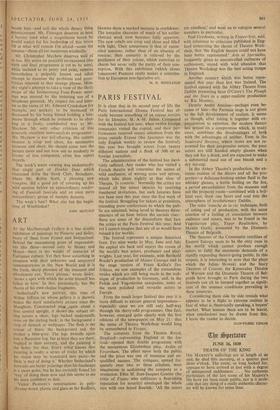PARIS FESTIVAL
Fr is clear that in its second year of life the Paris International Drama Festival has al- ready become something of an enfant terrible
for its Director, M. A.-M. Julien. Compared with the festival last year, when twelve foreign companies visited the capital, and their per-
formances received scanty attention from the press outside France (the Spectator was the only English weekly to review the festival), this year has brought actors from twenty different nations and a flock of 300 or so foreign journalists.
The administration of the festival has inevi- tably suffered. Any reader who has visited a French theatre will remember the scenes of wild confusion, of waving arms and uproar, which take place nightly at that altar of
Thespis, 'le cottirble.' Normally the critics are
spared all but minor injuries by receiving numbered invitations, but such luxuries have
not been seen this year since the first week of the festival. Struggling for tickets at premires, attending press conferences to which the pub- lic are admitted, being lured to theatres three- quarters of an hour before the curtain rises: these are some of the discomforts that face the critics at the Paris Festival this year. And yet I cannot imagine that any of us would have missed it for worlds..
The festival represents a unique theatrical feast. For nine weeks in May, June and July the capital sits back 'and enjoys the cream of the world's best actors, producers and play- wrights. Last year, for example, with Berthold
Brecht's production of Mutter Courage and in the stage version of Franz Kafka's Das Schloss, we saw examples of the tremendous
strides which are still being made in the tech- nique of production in Germany, and, in the Polish and Yugoslavian companies, some of the most polished and versatile actors in Europe.
From the much larger festival this year it is more difficult to extract general impressions— especially since we are still only half-way through the thirty-odd programmes. One fact. however, emerged quite clearly with the first
editions of the newspapers on May 21: that the name of Theatre Workshop would long be remembered in France.
The company from the Theatre Royal, Stratford—representing England at the fes- tival—opened their double programme with
the anonymous Elizabethan play, Arden of Feversham. The effect upon both the public and the press was one of immense and un- qualified success. The critiques, spread fre- quently over two or three columns, were
unanimous in acclaiming the company as a
revelation. Even M. Jean-Jacques Gautier (the critic of Figaro who cultivates a flourishing reputation for severity) enveloped the whole cast with one .broad flourish: 'All the actors are excellent,' and went on to eulogise several members in particular.
Paul Gordeaux, writing in France-Soir, said, with reference to criticisms published in Eng- land concerning the choice of Theatre Work- shop, that 'the English theatre could not have been better represented.' Arts et Spectacles, frequently given to uncontrolled outbursts of enthusiasm, stated with wild abandon that Theatre Workshop was the best acting trotipe in England.
Another country Which was better repre- sented this year than last was Ireland. The festival opened with the Abbey Theatre from Dublin presenting Sean O'Casey's The Plough and the Stars in a super-realistic production by Ria Mooney.
Despite Andre Antoine—perhaps even be- cause of him—the Parisian stage is not given
to the full development of realism. It seems as though, after taking it together with ex- pressionism to extremes, the modern theatre has settled on a compromise which, in many cases, combines the disadvantages of both with the advantages of neither. Even in the boulevard theatres, where tastes are not re- nowned for their progressive nature, the poor actors are still handed empty glasses when
they ask for a drink, and are expected to make a substantial meal out of one biscuit and a dry tea-cup.
In the Abbey Theatre's production,, the ex- treme realism of the clicors and all the pro- perties—a delicious-looking amber fluid in the
whiskey glasses, a kettle boiling on the fire, a period perambulator from the museum and not the property room—combined with a bril- liant cast, drew one heart and soul into the atmosphere of revolutionary Dublin.
The same 'tranche de la vie' technique, both of acting and of production, with the same
creation of a feeling of association between audience and actors, was to be found in the Yugoslavian play, Yew,. Boulitchov, by Maxim Gorki, presented by the Dramatic Theatre of Belgrade.
The theatres of the Communist satellites of Eastern Europe seem to be the only ones in the world which cannot produce enough actors to fulfil the enormous demands of a rapidly expanding theatre-going public. In this respect, it is interesting to note that the plays which the Julius Slowaki and the Slaty Theatres of Cracow, the Kameralny Theatre
of Warsaw and the Dramatic Theatre of Bel- grade have brought to Paris during the two festivals can all be lumped together as signifi- cant of the unusual conditions prevailing in these countries.
Considering them side by side reveals what appears to be a flight to extreme realism in face of what is, theatrically speaking, a buyers' market. What lessons there are to be learnt, what conclusions may be drawn from this, I leave the reader to decide.

















































 Previous page
Previous page